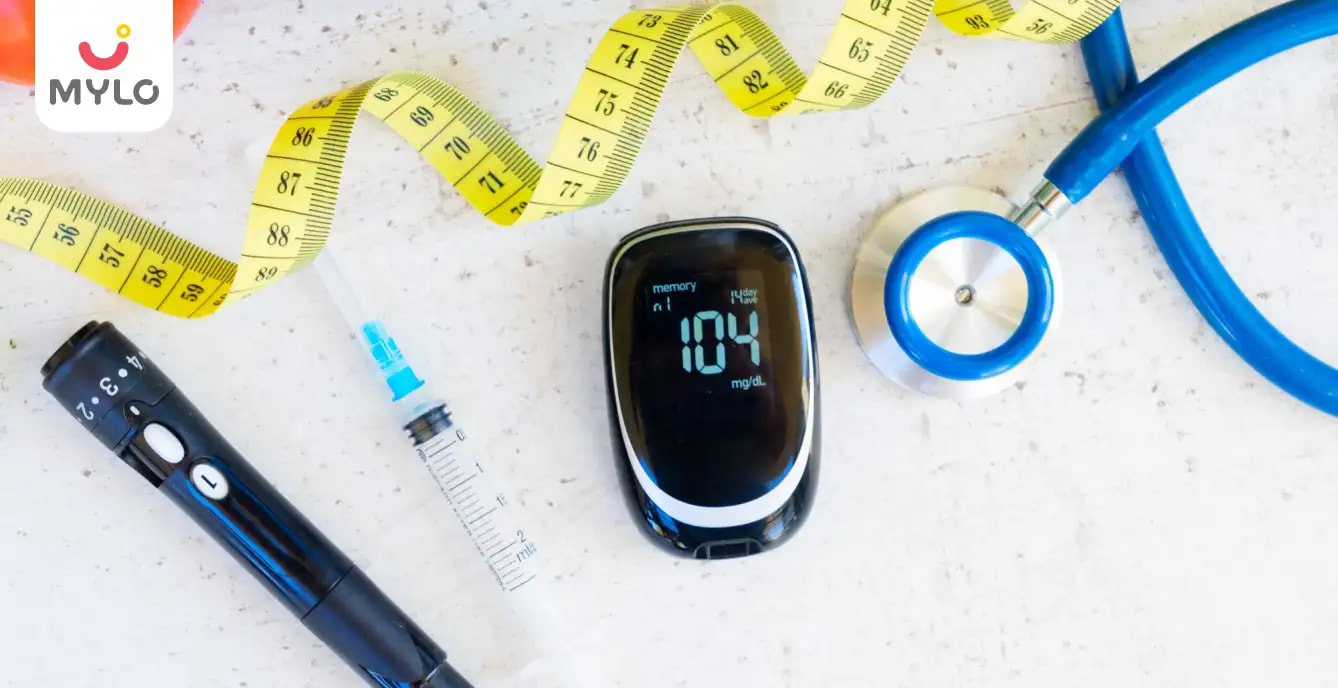Get MYLO APP
Install Mylo app Now and unlock new features
💰 Extra 20% OFF on 1st purchase
🥗 Get Diet Chart for your little one
📈 Track your baby’s growth
👩⚕️ Get daily tips

OR


Article Continues below advertisement
- Home

- Pregnancy Complications

- A Guide to Insulin Resistance: Symptoms and Diagnosis
In this Article
- What is Insulin?
- What is Insulin Resistance?
- Insulin Resistance Symptoms
- Signs of Insulin Resistance
- 1. Acanthosis nigricans
- 2. Polycystic Ovary Syndrome (PCOS)
- 3. Major depressive disorder (MDD)
- Risk Factors of Insulin Resistance
- Diagnosis and Insulin Resistance Tests
- What are the Causes of Insulin Resistance?
- 1. Excess Bodyfat
- 2. Certain Medications
- 3. Physical Inactivity
- Treatment of Insulin Resistance
- 1. Exercise
- 2. Get to a healthy weight
- 3. Eat a proper diet
- 4. Take medications
- Conclusion
- References
- Tags
Pregnancy Complications
A Guide to Insulin Resistance: Symptoms and Diagnosis
Updated on 3 November 2023
Insulin resistance occurs when the body's cells become less responsive to insulin, the vital hormone responsible for regulating blood sugar levels. This condition can have significant implications for overall health and may lead to serious health complications if left unaddressed.
In this guide, we will uncover the insulin resistance symptoms that may indicate insulin resistance, enabling early recognition and timely intervention. Armed with this knowledge, you can take proactive steps and learn how to reverse insulin resistance.
What is Insulin?
Insulin is a hormone produced by the beta cells of the pancreas. It is a peptide hormone that helps in keeping blood sugar levels in control. Furthermore, it also helps to store glucose in the liver and muscles. Insulin also helps regulate the metabolism of major biomolecules such as carbohydrates and fats.
Article continues below advertisment
What is Insulin Resistance?
Insulin resistance is a condition in which your body doesn't use insulin effectively. This means that your body needs more insulin to maintain normal blood sugar levels.
There are a variety of factors that can contribute to insulin resistance, including genetics, obesity, and a sedentary lifestyle. If you have insulin resistance, you're at an increased risk of developing type 2 diabetes. If you're insulin resistant, your cells can't use insulin properly. This causes your blood sugar to rise, which can lead to diabetes.
Fortunately, there are things you can do to manage insulin resistance and lower your risk of diabetes. These include eating a healthy diet, maintaining a healthy weight, and exercising regularly.
Insulin Resistance Symptoms
The most common insulin resistance symptoms include:
• Weight gain
Article continues below advertisment
• Fatigue
• Increased hunger
• Cravings for sweets
• Blurred vision
Article continues below advertisment
Signs of Insulin Resistance
Most of the time, these symptoms are not present in pre-diabetics, so diabetes is often left undiagnosed for many years. Many of such patients can experience the following symptoms when they are pre-diabetic:
1. Acanthosis nigricans
It is the darkening of the skin on the back, neck, and armpits.
2. Polycystic Ovary Syndrome (PCOS)
Insulin-related PCOS causes hormonal imbalance in women, which leads to infertility issues.
3. Major depressive disorder (MDD)
Insulin resistance doubles the risk of MDD and causes prolonged episodes of depression and sadness, as per a new study conducted at Stanford.
If you have any of these symptoms, it's essential to speak to your doctor. They can help you manage your condition and avoid any complications.
Article continues below advertisment
Risk Factors of Insulin Resistance
Insulin resistance is when the body does not produce enough insulin, a hormone that helps turn glucose into energy. As a result, glucose builds up in the blood.
Insulin resistance is more commonly known as pre-diabetes, which means your blood sugar levels are higher than usual but not high enough for you to be diagnosed with diabetes. This is the stage where you may start noticing issues such as increased hunger, increased thirst, and weight gain. If you have insulin resistance, your body has "high blood sugar," which can lead to serious health problems over time, such as type 2 diabetes, fatty liver disease, and several heart diseases.
Diagnosis and Insulin Resistance Tests
Your doctor might prescribe many types of insulin resistance tests in the body. Some of these tests include:
-
Fasting Plasma Glucose Test
-
Oral Glucose Tolerance Test
Article continues below advertisment
-
Hemoglobin A1C Test
All these tests measure the blood glucose level in your body to rule out the possibility of insulin resistance and diabetes in your body.
You may also like to read: Gestational Diabetes Mellitus in Pregnancy
What are the Causes of Insulin Resistance?
There's no one answer to this question as there can be several factors that contribute to insulin resistance. It's thought to be a combination of genetic and lifestyle factors. One of the main theories is that insulin resistance is caused by a diet high in refined carbohydrates and sugar. When you eat foods that are high in sugar, your body has to produce more insulin to process it. Over time, this can lead to insulin resistance. Here are some other factors that can lead to insulin resistance in the body—
1. Excess Bodyfat
Being overweight or obese is also thought to contribute to insulin resistance. Fat cells, especially the visceral fat (fat around your belly), can interfere with how insulin works, making it less effective.
Article continues below advertisment
2. Certain Medications
Beta-blockers and other medications such as steroids and some psychiatric medication can lead to insulin resistance. It can further lead to drug-induced diabetes if not taken care of.
3. Physical Inactivity
Other lifestyle factors that may play a role include a sedentary lifestyle, stress, and sleep deprivation. Furthermore, a sedentary lifestyle makes you obese, which again, as mentioned above, is the leading cause of insulin resistance.
Treatment of Insulin Resistance
You can learn how to reverse insulin resistance in the following points:
1. Exercise
Since a sedentary lifestyle is the leading cause of insulin resistance, regular exercise can help to keep it in check by increasing the glucose uptake of your body by at least 40%.
2. Get to a healthy weight
Losing weight can reduce the risk of type II diabetes by 58%.
Article continues below advertisment
3. Eat a proper diet
Avoid eating processed food that is loaded with carbs and unhealthy amounts of fats. Instead, eat a balanced diet.
Also read: Top 7 Diet Tips to Control Your Sugar Levels During Pregnancy
4. Take medications
Be very particular about your diabetes medication since a sudden increase in blood sugar levels can cause a stroke and be fatal too.
Conclusion
In conclusion, insulin resistance is a significant metabolic disorder that affects the body's ability to utilize glucose efficiently, leading to elevated blood sugar levels. It is a widespread condition with potential long-term health consequences if not managed effectively.
Recognizing the symptoms of insulin resistance early on is crucial for seeking timely medical attention and implementing appropriate lifestyle changes. A healthy diet, regular exercise, and weight management are essential in managing insulin resistance and improving insulin sensitivity.
Article continues below advertisment
While insulin resistance can be a challenging condition to address, with proper medical guidance and dedication to lifestyle modifications, individuals can take proactive steps towards mitigating its impact on their health.
References
1. Freeman, A. M., & Pennings, N. (2019). Insulin Resistance. Nih.gov; StatPearls Publishing.
2. Wilcox, G. (2005). Insulin and Insulin Resistance. The Clinical Biochemist. Reviews,
Tags
A Guide to Insulin Resistance: Symptoms and Diagnosis in Bengali
Article continues below advertisment
A Guide to Insulin Resistance: Symptoms and Diagnosis in Tamil



Written by
Madhavi Gupta
Dr. Madhavi Gupta is an accomplished Ayurvedic doctor specializing in Medical content writing with an experience of over 10 years.
Read MoreGet baby's diet chart, and growth tips

Related Articles
Related Questions
Hello frnds..still no pain...doctor said head fix nhi hua hai..bt vagina me pain hai aur back pain bhi... anyone having same issues??

Kon kon c chije aisi hai jo pregnancy mei gas acidity jalan karti hain... Koi btayega plz bcz mujhe aksar khane ke baad hi samagh aata hai ki is chij se gas acidity jalan ho gyi hai. Please share your knowledge

I am 13 week pregnancy. Anyone having Storione-xt tablet. It better to have morning or night ???

Hlo to be moms....i hv a query...in my 9.5 wk i feel body joint pain like in ankle, knee, wrist, shoulder, toes....pain intensity is high...i cnt sleep....what should i do pls help....cn i cosult my doc.

Influenza and boostrix injection kisiko laga hai kya 8 month pregnancy me and q lagta hai ye plz reply me

RECENTLY PUBLISHED ARTICLES
our most recent articles

Diet & Nutrition
গর্ভাবস্থায় আলুবোখরা: উপকারিতা ও ঝুঁকি | Prunes During Pregnancy: Benefits & Risks in Bengali

Diet & Nutrition
গর্ভাবস্থায় হিং | ঝুঁকি, সুবিধা এবং অন্যান্য চিকিৎসা | Hing During Pregnancy | Risks, Benefits & Other Treatments in Bengali

Women Specific Issues
স্তনের উপর সাদা দাগ: লক্ষণ, কারণ এবং চিকিৎসা | White Spots on Nipple: Causes, Symptoms, and Treatments in Bengali

Diet & Nutrition
গর্ভাবস্থায় পোহা: উপকারিতা, ধরণ এবং রেসিপি | Poha During Pregnancy: Benefits, Types & Recipes in Bengali

Diet & Nutrition
গর্ভাবস্থায় মাছ: উপকারিতা এবং ঝুঁকি | Fish In Pregnancy: Benefits and Risks in Bengali

Diet & Nutrition
গর্ভাবস্থায় রেড ওয়াইন: পার্শ্ব প্রতিক্রিয়া এবং নির্দেশিকা | Red Wine During Pregnancy: Side Effects & Guidelines in Bengali
- ইনার থাই চ্যাফিং: কারণ, উপসর্গ এবং চিকিৎসা | Inner Thigh Chafing: Causes, Symptoms & Treatment in Bengali
- গর্ভাবস্থায় ব্রাউন রাইস: উপকারিতা ও সতর্কতা | Brown Rice During Pregnancy: Benefits & Precautions in Bengali
- Velamentous Cord Insertion - Precautions, Results & Safety
- Unlock the Secret to Flawless Skin: 7 Must-Have Qualities in a Face Serum
- Unlock the Secret to Radiant Skin: How Vitamin C Serum Can Transform Your Complexion
- Gender No Bar: 10 Reasons Why Everyone Needs a Body Lotion
- Unlock the Secret to Radiant Skin How to Choose the Perfect Body Lotion for Your Skin Type
- Top 10 Reasons to Apply a Body Lotion After Every Bath
- Communication in Toddlers: Milestones & Activities
- How to Improve Vocabulary for Toddlers?
- A Comprehensive Guide to Understanding Placenta Accreta
- Vulvovaginitis in Toddlers Causes, Symptoms and Treatment
- A Comprehensive Guide to Understanding Cerebral Palsy in Children
- Bitter Taste in Mouth During Pregnancy: Understanding the Causes and Remedies


AWARDS AND RECOGNITION
Mylo wins Forbes D2C Disruptor award
Mylo wins The Economic Times Promising Brands 2022
AS SEEN IN
















At Mylo, we help young parents raise happy and healthy families with our innovative new-age solutions:
- Mylo Care: Effective and science-backed personal care and wellness solutions for a joyful you.
- Mylo Baby: Science-backed, gentle and effective personal care & hygiene range for your little one.
- Mylo Community: Trusted and empathetic community of 10mn+ parents and experts.
Product Categories
baby carrier | baby soap | baby wipes | stretch marks cream | baby cream | baby shampoo | baby massage oil | baby hair oil | stretch marks oil | baby body wash | baby powder | baby lotion | diaper rash cream | newborn diapers | teether | baby kajal | baby diapers | cloth diapers |












